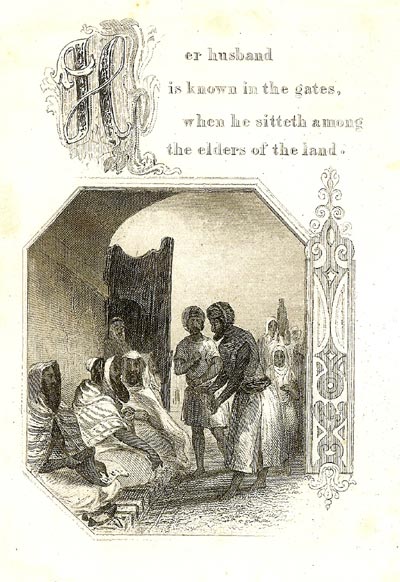*From The Excellent Woman of Proverbs 31 written in 1847 by Anne Pratt (1806-1893)
 It is indeed a high praise of a woman, that her husband should be known and honored for her sake; that in the places of public resort he should be recognised as the husband of a wife, who so arranged the household duties, and took so practical a part in the concerns of the family, that he was enabled to devote his time to public business.
It is indeed a high praise of a woman, that her husband should be known and honored for her sake; that in the places of public resort he should be recognised as the husband of a wife, who so arranged the household duties, and took so practical a part in the concerns of the family, that he was enabled to devote his time to public business.
HER HUSBAND IS KNOWN IN THE GATES
WHEN HE SITTETH AMONG THE ELDERS OF THE LAND.
WHEN HE SITTETH AMONG THE ELDERS OF THE LAND.
Proverbs 31:23

And as it was in the days of old, so is it now, that whatever position in life we may occupy, we cannot, stand alone. Whether individual conduct bring disgrace, or win respect, others must share in it. So, too, we all must influence others; and of all means of moral influence, none is greater than that of a good reputation. Without it, indeed, all good influence is lost.
It is remarkable, too, that our characters are generally read fairly, and well understood by those around us. Weight of character never fails to make its due impression.
The ancient custom of holding meetings for public justice under the gateway of the town, as well as the reference to the elders, leads us to the conclusion, that the husband of the Jewish woman held some office of public trust. As early as the time of Abraham, we find business transactions performed in the gate, when the patriarch purchased the cave of Machpelah, in the audience of the children of Heth; and the silver was weighed in the presence of all them that went in at the gate of the city (Gen 23:10-16). And Boaz bought of Naomi the land of his family, in the presence of the witnesses at the gateway, and of the elders (Rth 4:9).
If any man wished to meet with his neighbor, he went up to the gateway; if he had public news to communicate, he carried it thither. If he wished to attract the notice, or to win the ear of the governor of the city, he would sit day by day, as Mordecai did, in the king's gate. So, too, we find Isaiah speaking of him "that reproveth in the gate" (Isa 29:21); and Jeremiah delivered his solemn warnings and commands "in the gate of the children of the people" (Jer 17:19); and it was when the psalmist felt that he had become the object of the unjust reproaches of his neighbours, that he said, "They that sit in the gate speak against me." (Psa 69:12)